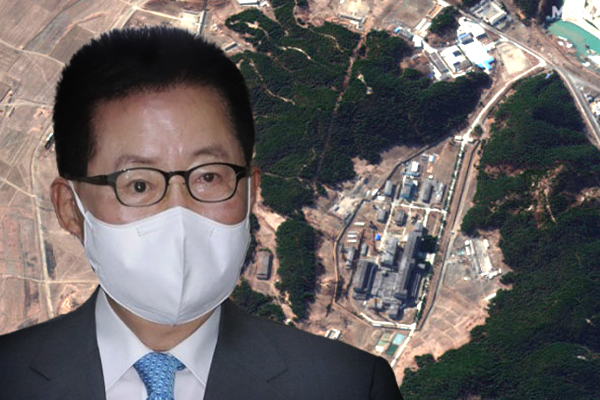It was revealed on Tuesday that Park Jie-won, the current head of South Korea’s National Intelligence Service (NIS), was aware of North Korea resuming operations at its plutonium-producing reactor in Yongbyon. However, he did not report this news to the National Assembly. South Korean conservatives are criticizing him for hiding this fact while arguing for the suspension of the joint military exercises with the United States.
The Munhwa Ilbo newspaper reported that the NIS knew about the North resuming activity at the reprocessing facility in February and the reactor in July. A source from the South Korean government told the newspaper, “We were aware of the activity going on at the Yongbyon facility and consulted with the United States on this issue.”
The NIS does not release this kind of information to the public directly. It typically provides such information to the National Assembly’s intelligence committee. In the committee’s meeting last August, Park told lawmakers that “there is nothing significant to report about North Korea.” He did not mention anything about the activity spotted at the Yongbyon facility for over a year. The Munhwa Ilbo reported that “the NIS, which should prioritize collecting information about the ongoing North Korean nuclear activity, has purposely ignored the restart of operations at the facility as they wanted to create an environment for resuming talks with North Korea.”
Park has faced controversy after his apparent intervention in politics earlier this year. In March, he told lawmakers on the intelligence committee that “I understand the importance of the joint military exercises with the United States, but at the same time I think it is necessary to conduct them in a flexible manner to keep the momentum up to resume communications with the North and draw a big picture about the denuclearization of the North.”
The International Atomic Energy Agency (IAEA) disclosed its annual report on North Korea’s nuclear activities on August 29. It reported that North Korea appears to have resumed operation of its plutonium-producing reactor at Yongbyon. This move could enable the reclusive country to expand its nuclear weapons arsenal. “Since early July, there have been indications, including the discharge of cooling water, consistent with the operation of the reactor,” the IAEA report said. It added that signs that the reactor is now being operated coincide with indications that North Korea is also using a nearby laboratory to separate plutonium from spent fuel previously removed from the reactor. The report noted that the Yongbyon reactor appeared to have been inactive from December 2018 until the beginning of July 2021.
Even with this situation, the South Korean government is continuing to express its audaciously naive way of thinking with regards to North Korea. An official from the South Korean presidential Blue House told reporters on August 31 that “the latest IAEA report suggests that the need for engaging with North Korea is urgent in order to solve the problem of their advancing nuclear capability.” The official added that “we are coming up with ways to resume talks with North Korea by coordinating closely with the United States.”
Unification Minister Lee In-young also argued on August 31 that resuming talks with North Korea is urgently needed. “The only solution to move toward the goal is to restart communications with North Korea even if the conditions for the negotiation is not met.” He added, “The table for talks and negotiations is not far away from us, but it is true that we do not have as much time as we would want.”
Lee also argued that humanitarian cooperation should continue separately from the international community’s sanctions. “Humanitarian cooperation should be separated from sanctions, and we need to find ways to cooperate on this topic more proactively. We need to be more flexible when considering this.”
The U.S. government also argued that the latest report suggests that the resumption of talks with North Korea is needed. White House press secretary Jen Psaki told reporters on August 30, “We are, of course, aware of this report and closely coordinating with our allies and partners on developments regarding North Korea.”
Psaki added that “this report underscores the urgent need for dialogue and diplomacy so we can achieve the complete denuclearization of the Korean Peninsula. We continue to seek dialogue with the DPRK so we can address this reported activity and the full range of issues related to denuclearization.”
A senior Biden administration official told the Wall Street Journal that “this report underscores the urgent need for dialogue and diplomacy so we can achieve the complete denuclearization of the Korean Peninsula.”
The United Nations also expressed concerns over the latest activity reported at the Yongbyon facility. “The Secretary-General is aware of the report and concerned by the latest developments,” said Stéphane Dujarric, spokesman for the Secretary-General. “He called for the DPRK to refrain from any nuclear weapon-related activities and resume talks with the other parties concerned. Diplomatic engagement remains the only pathway to sustainable peace and complete and verifiable denuclearization of the Korean Peninsula.”
Heo Eun-ah, press secretary of the main opposition People Power Party (PPP), released a statement on August 30 and criticized the Moon Jae-in administration for deceiving people about the North Korean nuclear threat.
“This is an expected outcome of the government focusing on the false show of peace without focusing on having North Korea keep its promise to denuclearize,” she said. “Maybe it is just this administration who did not expect this outcome after shutting their ears to recommendations made by every expert and members of the opposition party. President Moon Jae-in should acknowledge his failure on North Korean policy as the head of the government and apologize to the people.”


